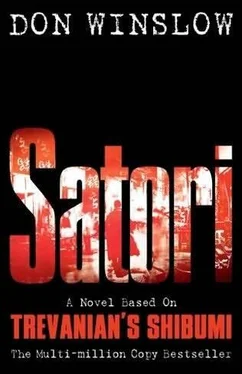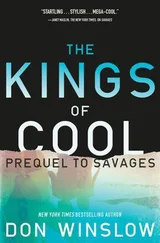“Bandits?”
“Bad people,” Ki said, shaking his head. “Very bad people.”
The porters shouldered the heavy crates on bamboo poles down the steep mountain trail, slippery with mud from the recent rains. The short legs and long trunks of these Puman tribesmen gave them an advantage that Nicholai did not possess as each step jarred his already sore knees and ankles. While the climb up from the last valley had been grueling, the descent down into the next was simply painful, and Nicholai thought that the route more than lived up to its sobriquet, “the Dragon’s Tail.”
They’d been on it for three days now, with another day yet to go before they reached the river and the boats.
The soldiers that Yu commandeered went out ahead and along the flanks. Some had Chinese “burp guns” slung over their shoulders, others carried captured American Mi rifles. At each pause in the day, and at their camps for the night, Yu gathered the soldiers and conducted study sessions on Marxist theory and Maoist thought.
Communism, Nicholai thought. It promises to make everyone equally rich and instead makes everyone equally poor.
During a break in the march one day, Nicholai took out a pack of cigarettes, shook out two, and offered one to Yu.
“French,” Yu observed. “They are very good, I think.”
“Take one,” Nicholai said. “You’re allowed the occasional bourgeois indulgence.”
A man needs a whiff of sin now and then, Nicholai thought, or he becomes something not quite a man. Yu took the proffered cigarette with an expression of delicious guilt. Nicholai lit it for him and Yu took a long drag. “It is very good. Thank you.”
“Not at all.”
Yu took two more short, disciplined puffs, carefully snuffed the cigarette out on the ground, put the butt in his shirt pocket, and buttoned it.
Nicholai thought of Solange, and missed her.
“Is there a girl at home?” he asked Yu.
“As a revolutionary,” Yu answered, “I have no time for bourgeois concepts such as romantic love.”
“So there is.”
Yu allowed himself a shy smile. “She is also a revolutionary. But perhaps someday, when the revolution has been established… You?”
“Yes. A French girl.”
“And you think about her.”
“Yes.”
After three years in prison, Nicholai thought he had come to terms with loneliness. Its return to his internal life was a mixed blessing. But, yes, he thought about Solange.
Too often and not often enough.
He took the next painful step down the mountain.
They stopped for the night at a Daoist monastery built on a small knoll along the side of the trail. The view was magnificent, the food somewhat less so, composed as it was of congee with small bits of vegetables and fish. But Nicholai ate ravenously and then stood on the periphery of a rectangular stone pavilion and watched the monks perform their kung-fu kata , which he recognized as the classic southern hung-gar form of “Tiger and Crane.”
Beautiful and doubtless deadly, he thought, although not as efficient as hoda korosu. But that was the main distinction between Chinese and Japanese martial arts – the former used many elaborate and circular moves while the latter emphasized one quick, direct, fatal strike.
Nicholai contemplated which was superior and decided that it was the Chinese for beauty, the Japanese for killing.
On the far side of the pavilion, Yu inflicted Communist doctrine on his students. One of the victims, a thick country lad named Liang, stared wistfully off into the bamboo thickets, doubtless wishing that he could find sanctuary there. But Liang was something of a special pet of Yu’s and so good-naturedly sat through the lecture as if genuinely interested. Yu had great, if misplaced, hopes for him.
One more day on the Dragon’s Tail, Nicholai thought. They would reach the river late the next afternoon and load their cargo onto the waiting boats. It would be a nice change to be on the water and off the arduous trail.
He walked back to the chamber that had been assigned to him. It was a small room with a single kang, the classic Chinese raised bed, which was draped with thin mosquito netting. Someone had already come in, lit a lantern, and left a thermos of hot water and an old porcelain cup with which to make tea.
But Nicholai craved rest more than the stimulation of the strong southern green tea, so he stripped off his clothes, climbed into the kang, and stretched out. He closed his eyes and told his mind to allow him five hours of sleep. He wanted to wake up well before dawn to make sure that the caravan got an early start.
Nicholai’s proximity sense woke him before his internal alarm did.
The two men smelled of cheap Chinese tobacco. Their heavy steps made clear that they were bandits and not professional assassins – they tried to walk quietly but were clumsy and obvious. Amateurs assume that to step slowly is to step softly, while professionals know that the opposite is true and are both quick and light.
Willing himself to remain still, Nicholai measured the slow heavy footsteps of the lead bandit as they creaked on the wooden floor. If they were going to use guns they would have done it already, but they apparently didn’t want to make noise and spring the main attack prematurely, before they had eliminated the leadership. So it would be a sword, a knife or an axe, maybe a garrote, but more likely an edged weapon that could slice through the mosquito netting, sparing the extra second to open it.
So there would be time for hoda korosu.
He edged his hand along the kang, felt for the teacup, and slid it beside him under the thin sheet. Silently he crushed the cup in his hand until he felt blood running from his palm, and then pinched the sharp shard of glass between his thumb and forefinger.
Then he waited.
The footsteps stopped and Nicholai felt the bandit pause as he lifted his arm to strike.
Nicholai swung the shard in a horizontal backhand that sliced the bandit’s throat. The knife arm came down in a limp, useless arc and then the bandit, his left arm futilely clutching his throat, pitched forward onto the kang.
The second bandit made the fatal error of backing up and reaching for the pistol at his belt as Nicholai launched off the kang, grabbed the heavy metal thermos, and swung it like a club. The man’s skull fractured with a sickening crack. Nicholai bent over his body, took the pistol, and stepped outside.
Red muzzle flashes tore the black silk fabric of the night.
Yu, clad only in trousers, stood with a pistol in his hand, trying to form the startled men into some kind of order.
Nicholai heard the zip-zip of gunfire and felt the little pockets of air concuss as the bullets flew past him. He had experienced bombings, beatings, and hand-to-hand combat, but this was his first firefight and he found it chaotic. The bandits had chosen a good time to strike, the hours of deepest sleep before dawn, and the fight had the surreal quality of a waking dream.
The bullets were real, however, and Nicholai heard the hollow thunk of a round strike the soldier beside him. The boy reached down to the hole in his stomach and looked at Nicholai with an expression of hurt surprise, as if to ask if this were really happening, then howled with pain. Nicholai eased him to the ground as gently as he could. The boy would die and there was nothing he could do.
He could only try to save the cargo.
Nicholai exchanged his pistol for the soldier’s rifle and moved out.
Yu was already rallying the men he had left toward the crates stacked in the monastery’s central pavilion. A few of the sentries guarding the crates had already fled, two others lay slumped dead at their posts, while three crouched behind the boxes and returned the shots that were coming from the bamboo thicket on the far side of the pavilion. But they were under heavy fire and it was obvious that they couldn’t hold out for long.
Читать дальше












